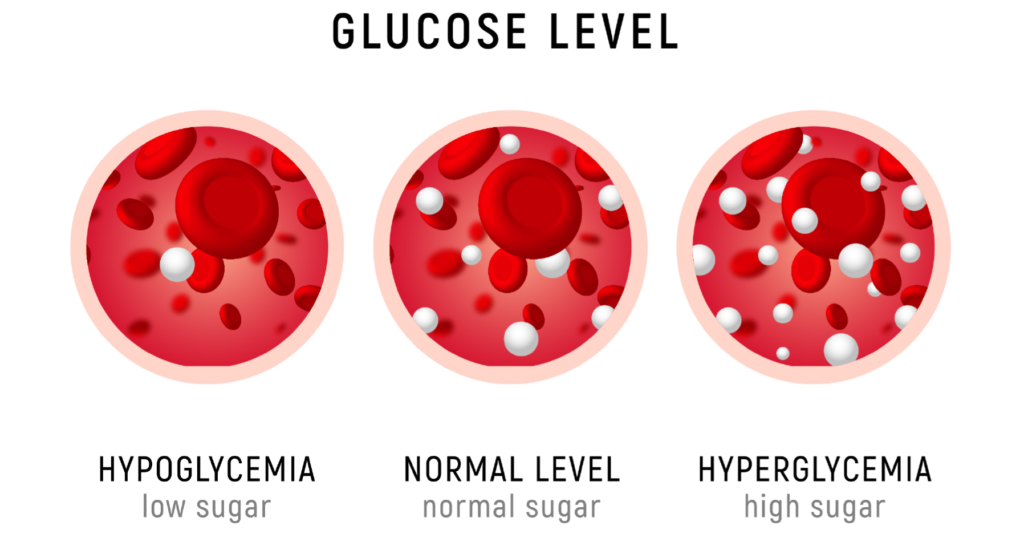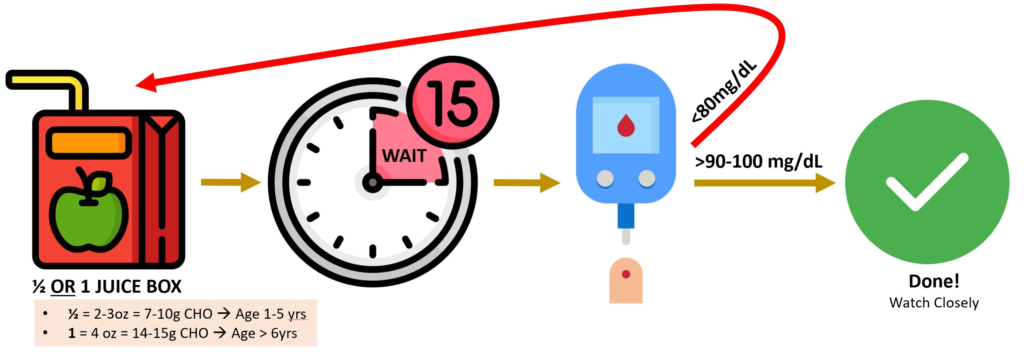Table of Contents
What is Hypoglycemia (Low Blood Sugar)?
Low blood sugar, also known as hypoglycemia, occurs when the glucose level in your blood drops below the normal range. This condition can cause various symptoms and requires prompt attention.A blood sugar level below 70 mg/dL (3.9 mmol/L) is low and can harm you. A blood sugar level below 54 mg/dL (3.0 mmol/L) is a cause for immediate action. You are at risk for low blood sugar if you have diabetes and are taking any of the following diabetes medicines: Insulin.
Symptoms of Low Blood Sugar Levels
Low blood sugar, or hypoglycemia, can present with various symptoms. Recognizing these early signs is crucial for prompt treatment. Here are the common symptoms of hypoglycemia(low blood sugar):
Shakiness
Feeling shaky or trembling is a typical early symptom of low blood sugar.
Sweating
Excessive sweating, even when not physically active, can indicate hypoglycemia.
Dizziness
A sudden feeling of lightheadedness or dizziness is a warning sign of dropping blood sugar levels.
Hunger
Intense hunger or a craving for sugary foods can occur when your blood sugar is low.
Rapid Heartbeat
An unusually fast heartbeat or palpitations may be experienced during hypoglycemia.
Confusion
Low blood sugar can affect your brain, leading to confusion or difficulty concentrating.
Irritability
You may feel unusually irritable or anxious when your blood sugar levels drop.
Blurred Vision
Vision may become blurred or impaired during episodes of low blood sugar.
Fatigue
A sudden feeling of extreme tiredness or weakness is common with hypoglycemia.
Headache
You might experience a headache when your blood sugar is low.
Numbness or Tingling
Some people feel numbness or a tingling sensation around the mouth or in the fingers.
If you notice any of these symptoms, it’s essential to check your blood sugar levels and take appropriate action to raise them. Quick treatment can prevent more severe complications and help you maintain your health.

Causes of Hypoglycemia (Low Blood Sugar):
Several factors can lead to hypoglycemia(low blood sugar levels). The most common causes of hypoglycemia(low blood sugar) include:

- Medication: Insulin or other diabetes medications can lower blood sugar too much.
- Skipping Meals: Not eating for extended periods can result in hypoglycemia(low blood sugar).
- Excessive Alcohol Consumption: Alcohol can interfere with the liver’s ability to release glucose.
- Intense Physical Activity: Vigorous exercise without adequate nutrition can deplete glucose levels.
- What causes low blood sugar without diabetes?
- Usually, hypoglycemia (low blood sugar) affects people with diabetes. But there are some reasons that you could have it without diabetes, including:
- Certain medications. Some medicines, such as the malaria drug quinine (Qualaquin), can cause low blood sugar. Other times, hypoglycemia(low blood sugar levels) happens when you take someone else’s diabetes medication by accident. Medications that can cause low blood sugar include pentamidine, beta-blockers, angiotensin-converting enzyme agents, and insulin-like growth factors.
- Some diseases. Severe hepatitis, cirrhosis, kidney failure, major infections, and heart disease can affect blood sugar. Sometimes, kidney problems make it harder for your body to pee out medicines. When you don’t pee them out, some medicines can collect and lower blood sugar(hypoglycemia).
- Malnutrition. Long-term starvation, such as when you have anorexia, can cause your body to use up its backup glycogen stores. This leads to hypoglycemia.
- Drinking too much alcohol. If you drink too much alcohol without eating, the liver can’t break down its backup glycogen supply into glucose. This causes low blood sugar.
- Some cancers. Certain pancreatic tumors can cause your body to make too much insulin. As a result, your body moves glucose out of the bloodstream faster than it can be replaced.
- Hormone issues. Some disorders, especially of the adrenal and pituitary glands, can affect hormones such as insulin and glucagon. Hypoglycemia(low blood sugar level) also can happen when children don’t have enough human growth hormone.
Immediate Treatment for Hypoglycemia

When you experience symptoms of hypoglycemia (low blood sugar level), quick action is essential. Here are steps to take immediately:
- Consume Fast-Acting Carbohydrates: Foods like glucose tablets, fruit juice, or regular soda can raise blood sugar quickly.
- Monitor Blood Sugar Levels: Check your blood glucose levels every 15 minutes to ensure they are rising.
- Follow Up with a Snack: After initial treatment, eat a snack that includes protein and complex carbohydrates to stabilize your levels.
- Severe hypoglycemia(low blood sugar) can be treated with intravenous (IV) dextrose followed by infusion of glucose. For conscious patients able to take oral (PO) medications, readily absorbable carbohydrate sources (such as fruit juice) should be given.
Prevention Tips for Low Blood Sugar
Preventing hypoglycemia (low blood sugar) involves proactive measures. Here are some tips to help maintain stable glucose levels and to prevent hypoglycemia:
- Regular Eating Schedule: Eat balanced meals and snacks at regular intervals.
- Monitor Blood Sugar Frequently: Regular monitoring helps detect any unusual drops in blood sugar levels.
- Adjust Medication as Needed: Consult with your doctor to adjust your medication if you experience frequent hypoglycemia.
- Limit Alcohol Intake: Avoid excessive drinking and always pair alcohol with food to prevent hypoglycemia.
Tips for Better Health
Managing hypoglycemia (low blood sugar) is part of maintaining overall health. Here are additional tips to support your well-being:
- Stay Hydrated: Drink plenty of water throughout the day is good for preventing hypoglycemia.
- Balanced Diet: Include a variety of foods to ensure you get essential nutrients.
- Regular Exercise: Engage in moderate physical activities regularly.
- Stress Management: Practice stress-relief techniques like meditation or yoga.

FAQs
What are the symptoms of hypoglycemia (low blood sugar)?
Symptoms include shakiness, sweating, confusion, dizziness, and rapid heartbeat.
How can I quickly raise my blood sugar?
Consume fast-acting carbohydrates such as glucose tablets, fruit juice, or regular soda.
Can low blood sugar be dangerous?
Yes, severe hypoglycemia can lead to unconsciousness or seizures and requires emergency medical attention.
How often should I check my blood sugar levels?
Follow your doctor’s advice, but generally, monitoring before and after meals and during physical activity is recommended.
Can exercise cause low blood sugar?
Yes, especially intense or prolonged exercise without adequate nutrition can lower blood sugar levels.
By understanding the causes, treatments, and prevention strategies for low blood sugar, you can take control of your health and avoid the complications associated with hypoglycemia.
